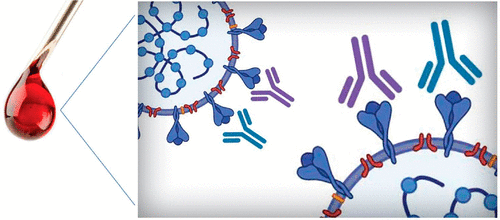Our official English website, www.x-mol.net, welcomes your feedback! (Note: you will need to create a separate account there.)
COVID-19 Antibody Tests and Their Limitations
ACS Sensors ( IF 8.9 ) Pub Date : 2021-02-05 , DOI: 10.1021/acssensors.0c02621 Guoqiang Liu 1, 2 , James F Rusling 2, 3, 4, 5
ACS Sensors ( IF 8.9 ) Pub Date : 2021-02-05 , DOI: 10.1021/acssensors.0c02621 Guoqiang Liu 1, 2 , James F Rusling 2, 3, 4, 5
Affiliation

|
COVID-19, caused by the SARS-CoV-2 virus, has developed into a global health crisis, causing over 2 million deaths and changing people’s daily life the world over. Current main-stream diagnostic methods in the laboratory include nucleic acid PCR tests and direct viral antigen tests for detecting active infections, and indirect human antibody tests specific to SARS-CoV-2 to detect prior exposure. In this Perspective, we briefly describe the PCR and antigen tests and then focus mainly on existing antibody tests and their limitations including inaccuracies and possible causes of unreliability. False negatives in antibody immunoassays can arise from assay formats, selection of viral antigens and antibody types, diagnostic testing windows, individual variance, and fluctuation in antibody levels. Reasons for false positives in antibody immunoassays mainly involve antibody cross-reactivity from other viruses, as well as autoimmune disease. The spectrum bias has an effect on both the false negatives and false positives. For assay developers, not only improvement of assay formats but also selection of viral antigens and isotopes of human antibodies need to be carefully considered to improve sensitivity and specificity. For clinicians, the factors influencing the accuracy of assays must be kept in mind to test patients using currently imperfect but available tests with smart tactics and realistic interpretation of the test results.
中文翻译:

COVID-19 抗体测试及其局限性
由 SARS-CoV-2 病毒引起的 COVID-19 已发展成为一场全球健康危机,导致超过 200 万人死亡,并改变了世界各地人们的日常生活。目前实验室的主流诊断方法包括核酸PCR检测和用于检测活动性感染的直接病毒抗原检测,以及针对SARS-CoV-2的间接人类抗体检测以检测先前的暴露情况。在本视角中,我们简要描述了 PCR 和抗原测试,然后主要关注现有的抗体测试及其局限性,包括不准确和不可靠的可能原因。抗体免疫测定中的假阴性可能由测定形式、病毒抗原和抗体类型的选择、诊断测试窗口、个体差异和抗体水平的波动引起。抗体免疫检测假阳性的原因主要涉及抗体与其他病毒的交叉反应以及自身免疫性疾病。频谱偏差对假阴性和假阳性都有影响。对于检测开发人员来说,不仅需要改进检测形式,还需要仔细考虑病毒抗原和人抗体同位素的选择,以提高灵敏度和特异性。对于临床医生来说,必须牢记影响检测准确性的因素,以便使用当前不完善但可用的测试,通过智能策略和对测试结果的现实解释来测试患者。
更新日期:2021-03-26
中文翻译:

COVID-19 抗体测试及其局限性
由 SARS-CoV-2 病毒引起的 COVID-19 已发展成为一场全球健康危机,导致超过 200 万人死亡,并改变了世界各地人们的日常生活。目前实验室的主流诊断方法包括核酸PCR检测和用于检测活动性感染的直接病毒抗原检测,以及针对SARS-CoV-2的间接人类抗体检测以检测先前的暴露情况。在本视角中,我们简要描述了 PCR 和抗原测试,然后主要关注现有的抗体测试及其局限性,包括不准确和不可靠的可能原因。抗体免疫测定中的假阴性可能由测定形式、病毒抗原和抗体类型的选择、诊断测试窗口、个体差异和抗体水平的波动引起。抗体免疫检测假阳性的原因主要涉及抗体与其他病毒的交叉反应以及自身免疫性疾病。频谱偏差对假阴性和假阳性都有影响。对于检测开发人员来说,不仅需要改进检测形式,还需要仔细考虑病毒抗原和人抗体同位素的选择,以提高灵敏度和特异性。对于临床医生来说,必须牢记影响检测准确性的因素,以便使用当前不完善但可用的测试,通过智能策略和对测试结果的现实解释来测试患者。

























 京公网安备 11010802027423号
京公网安备 11010802027423号